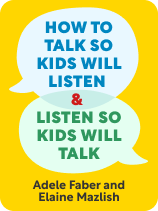

This article is an excerpt from the Shortform book guide to "How to Talk So Kids Will Listen & Listen So Kids Will Talk" by Adele Faber and Elaine Mazlish. Shortform has the world's best summaries and analyses of books you should be reading.
Like this article? Sign up for a free trial here.
What’s the importance of acknowledging children’s feelings? How can you validate your child’s emotions?
In How to Talk So Kids Will Listen & Listen So Kids Will Talk, authors Adele Faber and Elaine Mazlish claim that one key to communicating better with your children is acknowledging that you understand their feelings. They argue that even babies want adults to acknowledge how they feel.
Read on to learn the importance of acknowledging children’s feelings, according to Faber and Mazlish.
Why Acknowledge Your Children’s Feelings?
In How to Talk So Kids Will Listen & Listen So Kids Will Talk, authors and educators Adele Faber and Elaine Mazlish stress that a key to communicating better with your child is to show that you understand, accept, and empathize with their feelings. They argue for the importance of acknowledging children’s feelings based on the fact that children, even babies, want adults to understand how they feel, especially when they feel unhappy.
But how you respond is important. First, here’s what not to do when your child expresses strong feelings, according to the authors. Don’t deny a child’s feelings by saying something like “You’re just tired,” “You don’t really hate your brother,” or “You can’t be hungry! You just ate.” Don’t just tell them, “It’s not a big deal. Calm down” or “You’re not acting your age.”
Now, here’s what Faber and Mazlish recommend instead.
How to Acknowledge a Child’s Feelings
Faber and Mazlish emphasize the importance of acknowledging children’s feelings, claiming that instead of dismissing or minimizing them, it’s best to accept and validate your child’s feelings. All feelings are O.K., even if all behaviors are not. You can say, “I can see you’re upset that your sister broke a crayon, “You’re mad at your brother,” or “So you’re still hungry, even though you just had lunch.” Echo your child’s feelings: For example, if your child is disappointed, express disappointment in your own voice. Faber and Mazlish explain that your empathy can calm your child, open them up to talking more, and give them the confidence to start solving their problem.
Don’t say vague philosophical things like “life isn’t fair,” start giving advice right away, ask accusatory questions, drown them in pity, or defend the person they’re angry at. Ignoring or glossing over their feelings this way can make children feel defensive, helpless, and more upset. The authors stress that this way of communicating takes practice because many of us didn’t grow up with parents who understood the importance of acknowledging children’s feelings.
| The Importance of Acknowledging Children’s Feelings in Today’s Society In the 40 years since this book was written, psychologists have learned a lot more about the importance of validating a child’s feelings. Researchers have found that children whose parents validate their feelings are emotionally healthier. As Dr. Margaret Areizaga explains, helping your child learn how to regulate their own emotions gives them a crucial tool they can use throughout their life. If a parent constantly disregards children’s feelings, they feel powerless and start to distrust or ignore their own emotions. The inability to regulate feelings, Dr. Areizaga points out, can be a factor in Attention Deficit/Hyperactivity Disorder (ADHD), Oppositional Defiant Disorder (ODD), anxiety, depression, and other mental health issues. When you show your child you understand what they’re feeling, they feel that they’ve successfully communicated their emotions to you and may start to calm down. It also gives them the confidence that they can express how they feel with words like “frustrated” or “angry” instead of throwing a tantrum or hitting. Above all, it’s important to model emotional self-regulation yourself, Dr. Areizaga says. For example, you could say to your child, “I’m trying to register you for camp right now, and I’m getting frustrated. It’s natural to feel that way because the website is complicated! I’m going to take a break and try again later today when I’m calmer.” |
Give Your Child Words for Those Feelings
Just as you do with praise, Faber and Mazlish say you should be descriptive when talking about negative feelings. Don’t worry that telling a child they’re “afraid” or “sad” or “disappointed” will make them feel worse. The importance of acknowledging your children’s feelings relates to how it helps them to feel understood and helps them to build a vocabulary for their emotions, the authors say.
(Shortform note: Here are some tips to build your child’s emotional vocabulary. Use picture books to help your child learn the words for different feelings; praise your child when they discuss their feelings; and talk about feelings while going about daily activities, not just when tensions are high.)
Grant Them Their Wishes in a Make-Believe Way
Faber and Mazlish explain that just seeing that their parents realize how badly they want something can help a child. To emphasize your understanding and empathy, they suggest using hypotheticals. For example, if your child says they don’t want to do their homework, you could reply, “It’s frustrating to have to come home from a long day at school and have homework to do. I wish I could wave a magic wand and give you more time in the day to play!”
| Role-Playing Can Be Great Preparation for Everyday Life In Peaceful Parent, Happy Kids: How to Stop Yelling and Start Connecting,Dr. Laura Markham builds on Faber and Mazlish’s advice to use hypotheticals. She suggests that parents use stuffed animals to role-play difficult scenarios with their children. For example, if your child is giving you a hard time about doing their homework, act out different possible scenes, taking turns being the “parent” and “child.” Markham says don’t be afraid to get silly. This could mean including some scenes in which the child does their homework in invisible ink, or homework is canceled forever. These role-playing scenarios, writes Markham, are another way of granting your child’s wishes in fantasy. |
In advocating for the importance of acknowledging your children’s feelings, Faber and Mazlish conclude that simply empathizing puts parent and child on the same side instead of in opposition.
Acknowledging Feelings: Talking to the Next Generation
In the afterword of How to Talk So Kids Will Listen & Listen So Kids Will Talk, Faber and Mazlish write that decades later, their advice about communication and respect is more relevant than ever. At a time when parents are busy and stressed, work-life balance is hard to achieve, social media promotes distraction and bullying, and children are getting phones in fourth grade, parents and children need all the help they can get in learning how to be kind to each other and themselves.
One of the last sections of the book is a 2012 note by Adele Faber’s daughter, Joanna, a former elementary school teacher who is carrying on her mother’s work.
(Shortform note: Besides contributing to Faber and Mazlish’s book How to Talk So Kids Can Learn at Home and in School, Joanna has written two recent books along with Julie King: How To Talk So Little Kids Will Listen (2017), focused on children from two to seven, and How To Talk When Kids Won’t Listen (2021). Joanna Faber and King created the companion app, HOW TO TALK: Parenting Tips in Your Pocket, as well as the app Parenting Hero. They also lead online workshops.)
Joanna Faber writes that even though she had been raised in a respectful and accepting environment because of her mother’s parenting style, she found it wasn’t so easy to have patience when she had kids of her own. Sometimes she found herself saying, “Why did you do that? I just told you not to!” or “Fine, I’ll leave you here.”
But she echoes her mother’s message that as a parent, you always get another chance to respond better to your child’s misbehavior. Joanna Faber writes that the importance of acknowledging children’s feelings, to her, is the most fundamental skill discussed in the book. It can often solve the problem; sometimes empathy alone makes a child feel better. And it creates a relationship of mutual respect so that many problems don’t even occur.
(Shortform note: Joanna Faber’s How to Talk When Kids Won’t Listen updates her mother’s advice with scientific research, especially about the importance of acknowledging children’s feelings. For example, she discusses a study that tracked parents with varying communication styles over a few years. It found that children whose parents accepted their feelings were less stressed, had longer attention spans, behaved better, scored higher on achievement tests, and got along better with others. The effects were even physiological; these kids had stronger immune systems. These results suggest that Adele Faber and Elaine Mazlish were ahead of their time in developing a parenting approach that emphasizes empathy.)
Exercise: Practice Acknowledging Feelings
Instead of denying a child’s feelings, the authors recommend that parents accept whatever emotions a child expresses, and help the child label them. Here’s some practice diagnosing and responding to negative feelings.
- If your child says, “I played the wrong note on my recorder in music class, and everyone looked at me and laughed. I hate everyone in my class!,” how might they be feeling? What could you say to acknowledge that feeling?
- If your child says, “My swim teacher told me I couldn’t move on to the next level, and I have to be a guppy again. I’m so bad at swimming?” how might they be feeling? What could you say to acknowledge that feeling?
- How about, “I don’t know whether to be friends with Michael any more. We’ve been friends since kindergarten, but these days he hangs out with some mean kids and isn’t always nice to me. But he asked me to come over to his house tomorrow”?
- Now let’s reflect on an experience from your own life. Describe a time recently when your child said something that you found difficult to respond to with empathy. What did you say?
- The next time your child says something that makes you upset—like telling you they hate you, or that your family trip to the zoo was stupid—what could you say to acknowledge their feelings? (Remember, the authors emphasize the importance of being open to how your child feels and giving them words to describe their emotions.)

———End of Preview———
Like what you just read? Read the rest of the world's best book summary and analysis of Adele Faber and Elaine Mazlish's "How to Talk So Kids Will Listen & Listen So Kids Will Talk" at Shortform.
Here's what you'll find in our full How to Talk So Kids Will Listen & Listen So Kids Will Talk summary:
- How to build mutually respectful relationships with your children
- How to make your children feel heard and understood
- Methods for effectively praising and scolding your children






